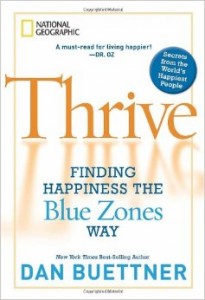By Jonathan Chevreau
Happiness, longevity, health and money are all (as you might expect) intertwined. In his book, You Can Retire Sooner Than You Think (also reviewed here at the Hub), Wes Moss focuses on the five money secrets of the happiest retirees.
One of the books he mentions is Dan Buettner’s The Blue Zones: Lessons for Living Longer From the People Who’ve Lived the Longest. We will review that book, first published in 2008, in due course.
In the meantime, we’re going to look at Buettner’s followup book on happiness: Thrive: Finding Happiness the Blue Zones Way, originally published by National Geographic in 2010.
To research the book, Buettner travelled to four of the world’s allegedly happiest countries, two of which I’ve visited myself: Denmark and Mexico, and two I haven’t: Singapore and San Luis Obisco (in California). In each locale he contacts local elders known for their wisdom about happiness and how the city or country built its infrastructure to maximize it.
He then wraps it all up by summing up what these nations have in common with a chapter entitled Lessons in Thriving.
He concludes there are six “life domains” that can be shaped to boost one’s chances for happiness. These six “thrive centers” are:
1.) Community
Where you live is hugely important to happiness and the happiest spots tend to promote economic freedom, a high employment rate, tolerance, quality government, more community space, limited shopping hours, a limited workweek (37 hours in Denmark), support for the Arts, walkability, quiet surroundings and plenty of sidewalks and bike lanes.
2.) Workplace
The happiest workers are in jobs that don’t have long commutes, limit the workweek to 40 hours, take six weeks of vacation a year, socialize with co-workers and have the right boss. However, the self-employed and business owners report higher levels of well-being.
3.) Social Life
The wider your social network, the happier you’re likely to be. Buettner suggests joining clubs, creating your own Moai (a group of mutually committed friends), reconnecting with your faith, marrying the right person (someone similar to you with similar tastes and earning ability).
4.) Financial life
The book quotes Ed Diener to the effect “the key to greater well-being is to have money but not to want it too much.” (author’s emphasis). He recommends paying off your house (consistent with the Hub’s stance that the foundation of financial independence is a paid-for home, something Wes Moss also advocates), enrolling in automatic savings programs, avoid credit cards, create a giving account and invest in experiences rather than stuff. (also consistent with the motto in Findependence Day: “Freedom, Not Stuff!”).
5.) Home
The happiest homes have fewer television screens, ideally only one, they cancel their cable TV, own a pet, create a meditation space, create a “pride shrine” of family awards and trophies, grow a garden, maximize sunlight and reserve bedrooms for sleep, not electronic distractions.
6.) Self & Purpose
To yield well-being benefits for the long run, the book suggests you “recognize your values, strengths, talents, passions and gifts.” Once you do, this should help you realize your life purpose: determining “your reason for getting up in the morning.” He mentions Richard Leider’s bestselling The Power of Purpose, which uses the simple formula G+P+V=C. That is, Gifts plus Passion plus Values equals Calling.


